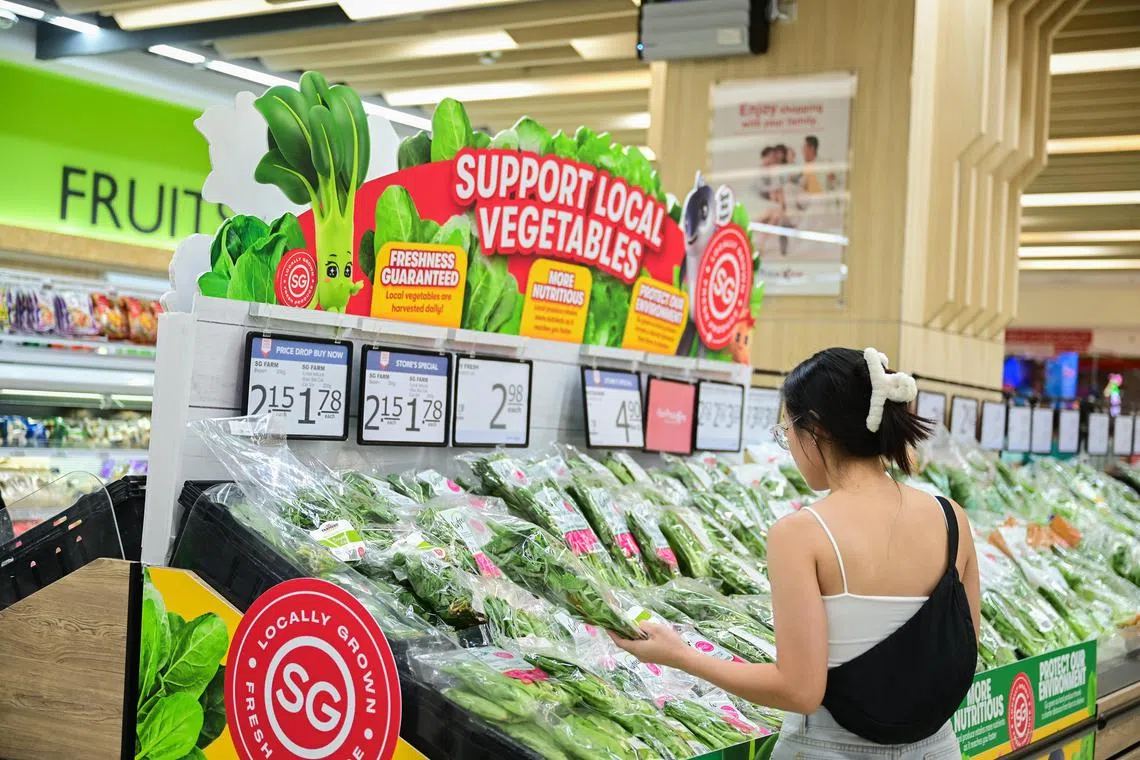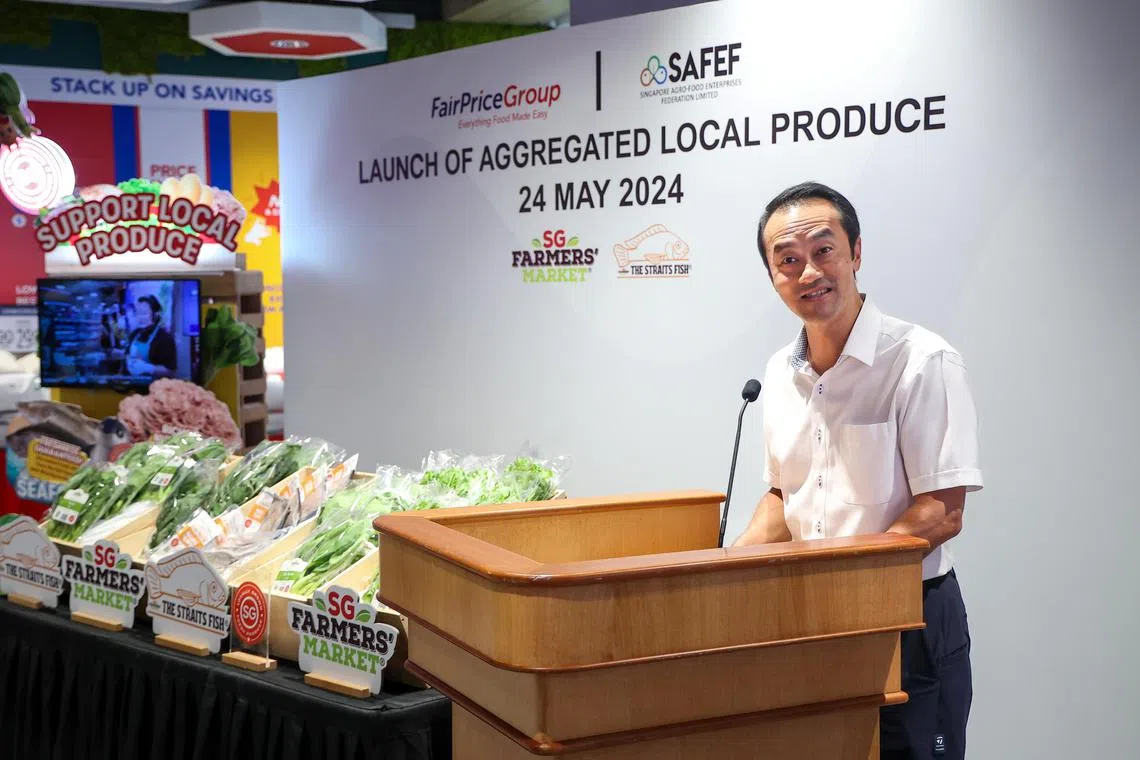Home-grown greens sold for as low as $1.78 per pack at FairPrice in pilot to help local farms
Sign up now: Get ST's newsletters delivered to your inbox

SFA’s 2023 food statistics report showed that local vegetable production accounted for only 3.2 per cent of total food consumption.
ST PHOTO: AZMI ATHNI
Follow topic:
SINGAPORE – Cheaper locally grown vegetables and tilapia fish are available at many FairPrice supermarkets islandwide under a six-month trial to help local farms aggregate supply and demand, and push produce out to consumers.
Chye sim, lettuce and xiao bai cai grown by two local farms, Cropciti and Metro, are selling at $1.78 per 200g under the brand SG Farmers’ Market, while bayam is going for $2.15 per 200g pack.
Other local farms are generally selling their veggies at higher prices. For instance, Green Harvest is selling its cai xin hua at $3.23 for a 300g bag, while its xiao bai cai is going for $2.52 for 250g.
Under the pilot, tilapia fish is going at a promotional price of $4.90 for a whole fish and $5.90 for a fillet – $1 less than their regular prices.
The fish, which are gathered from several local fish farms in the West Johor Straits and then processed, are sold under the brand name The Straits Fish.
SG Farmers’ Market and The Straits Fish are two brands that are part of the initiative by the Singapore Agro-Food Enterprises Federation (Safef).
To support the local agri-food industry, Safef, the Seafood Industries Association (Singapore) and At Fresh, a fresh fruit and vegetable distributor, have taken on the role of demand and supply aggregators for vegetable and fish products.
The three players have been speaking to food businesses in the hotel, restaurant and catering sectors, as well as supermarket retailers, to better understand the industry’s needs and demand for fresh produce.
This comes as higher prices of local produce have been a concern among consumers, who say this is a reason for the lack of demand for these items. A 300g pack of xiao bai cai from Malaysia costs around $1.80, for instance.
The Singapore Food Agency’s 2023 food statistics report showed that local vegetable production accounted for only 3.2 per cent of total food consumption,
Safef’s chief executive Ken Cheong said that the six-month pilot will allow time for farmers to work together and smoothen out any operational or logistical challenges that may arise, although the prices for the different produce will remain “more or less the same” after the pilot.
The SG Farmers’ Market and The Straits Fish products were officially launched on May 24 at the FairPrice Xtra supermarket at Jem. The vegetable products will be available at 44 FairPrice stores, while The Straits Fish products will be available at 20 stores.
Speaking at the event, Senior Minister of State for Sustainability and the Environment Koh Poh Koon said the pilot “will help our farms grow and make it easier for Singaporeans to buy local produce”.
He stressed the importance of building a “strong agri-food system” where various players “synergistically support one another”.

Senior Minister of State for Sustainability and the Environment Koh Poh Koon at the launch of The SG Farmers’ Market and The Straits Fish products on May 24.
PHOTO: LIANHE ZAOBAO
This is important as local food production can act as a form of insurance during times of overseas supply disruptions.
Dr Koh said that the three parties doing the aggregating of demand “worked with local farmers to consolidate their production capabilities to meet this demand from buyers”.
The aggregator arrangement helps to facilitate longer-term contracts between farms and buyers, leading to greater sales of local produce, he added.
Asked about how Safef is able to sell SG Farmers’ Market vegetables at such low prices, Mr Cheong said that, through the initiative, the costs of production borne by each farm can be reduced by maximising efficiencies in logistics, branding and packaging.
As for whether the low prices of vegetables could be seen as potentially undercutting the market for other local farms, Mr Cheong said: “The market is bigger than all of us. (Farms) will have to work together to take on the market. It is quite myopic to think that there is internal competition.”
Local farm Green Harvest declined to comment on whether it found the prices to be too low, or if it would consider selling under the SG Farmers’ Market label.
Netatech, which sells assorted vegetables from kailan to round bayam and red bayam, is offering its produce at $2.98 per 250g pack, with a promotion of $4.90 for two packs. The Straits Times has reached out to the company for comment on the prices.
Another farm, LivFresh, is also offering its baby bok choy and Chinese endive for $2.98 per 250g pack.
Its founder and chief executive Karthik Rajan told ST that the Safef initiative is great for new farms looking to enter the market, and having such support back when LivFresh first started launching its products would have been “very helpful”.
This is because offtake, or being able to sell the produce to consumers, is a key focus for farms at the early stage, and listing with supermarkets can be a very arduous process.
“But now, as (LivFresh is) a more mature farm with an existing presence (in the market), there is not much value going through this route... as our own brand visibility is also important,” Mr Rajan added.
While the lower price point of SG Farmers’ Market produce is a concern for other local farms, he felt that the initiative will overall help the local produce segment to grow.
Imported Asian leafy greens from Malaysia, such as xiao bai cai, are going as low as $1.83 for a 300g pack, but these do not come with “pesticide-free” assurance to consumers.
Mr Cheong said that consumers who opt for SG Farmers’ Market produce may be willing to pay a slight premium for vegetables that are pesticide-free.
Aside from getting more farms on board for its initiatives, Safef is also working with indoor vegetable farms to launch a salad mix, he said.


